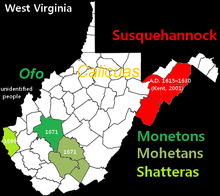 | |
| Total population | |
|---|---|
| extinct as a tribe | |
| Regions with significant populations | |
| West Virginia | |
| Languages | |
| Moneton language | |
| Religion | |
| Indigenous religion | |
| Related ethnic groups | |
| likely Manahoac and Monacan[1] |
The Moneton were a historical Native American tribe from West Virginia. In the late 17th century, they lived in the Kanawha Valley near the Kanawha and New Rivers.[2]
Name
Their name translates to "Big Water" people.[1] In the 1670s, Abraham Wood wrote their name "Moneton" and as another variant, "Monyton."[citation needed]
Territory
The Moneton lived in southern West Virginia, along the Kanawha River.[1] Their settlements were near the Manahoac, Moneton, and Tutelo, Siouan language–speaking tribes of Virginia.[3]
History

The Moneton may have been a Fort Ancient culture,[4] an Indigenous culture that thrived from 1000 to 1750 CE in the Ohio River Valley. They might have been related to the Shawnee, an Algonquian-speaking people.[4]
The first written mention of the Moneton was made by English settler Thomas Batts in 1671.[1]
In 1674, English colonist Abraham Wood sent his servant Gabriel Arthur from Fort Henry in Wheeling, West Virginia to visit local tribes to expand the fur trade.[5] Arthur visited them and described their capital as "a great town,"[1] which might be Saint Albans or Buffalo, West Virginia.[5] That is the last contemporary mention of them.[1]
They likely merged into other Siouan-speaking tribes in the Piedmont region of Virginia.[1]
Language
| Moneton | |
|---|---|
| Native to | United States |
| Region | West Virginia |
| Extinct | likely late 17th century |
Siouan
| |
| Language codes | |
| ISO 639-3 | tta (as Tutelo) |
| Glottolog | None |
The Moneton language was a Siouan language and likely related to Manahoac, Monacan, and Ofo languages.[1]
See also
- History of West Virginia
- Fort Ancient
- Prehistory of West Virginia
- Protohistory of West Virginia
- West Virginia Waterways
Notes
References
- Demallie, Raymond J. "Tutelo and Neighboring Groups." Sturtevant, William C., general ed. Raymond D. Fogelson, volume ed. Handbook of North American Indians: Southeast. Volume 14. Washington DC: Smithsonian Institution, 2004. ISBN 0-16-072300-0.
- Rice, Otis K.; Brown, Stephen W. (2010). West Virginia: A History. Lexington: University Press of Kentucky. pp. 9, 13. ISBN 9780813127330.
- Swanton, John Reed (1952). The Indian Tribes of North America. Washington, DC: US Government Printing Office. p. 74.
